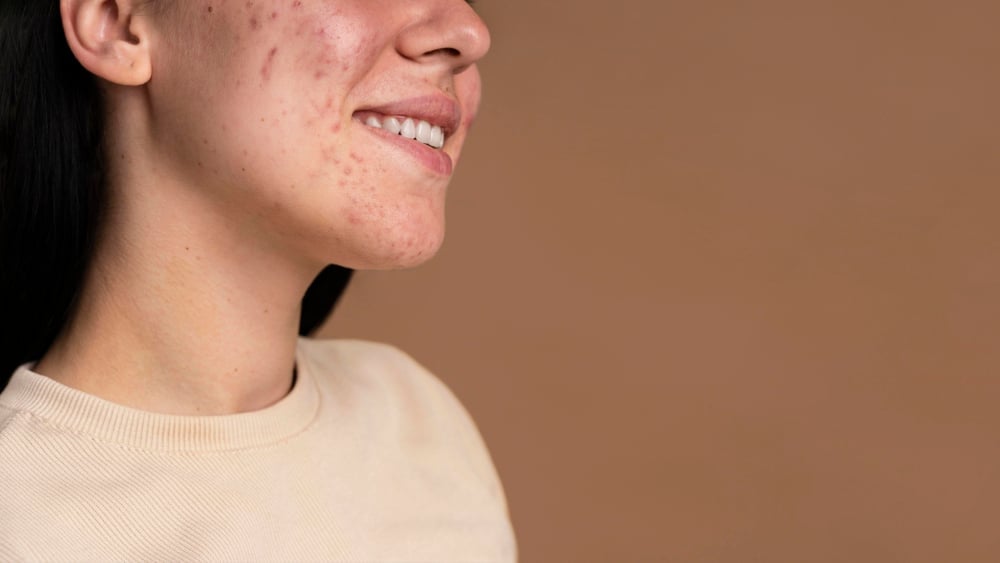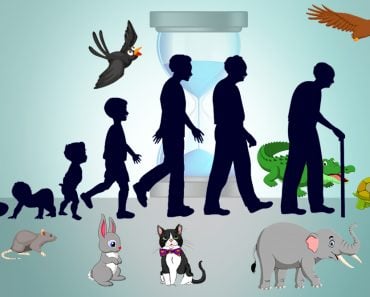Table of Contents (click to expand)
According to a 2016 study by researchers at King’s College London, those who had acne when they were younger also had longer telomeres and a change in certain cellular pathways related to age. This is a correlation, and the precise explanation for this mechanism remains unclear.
Drawers brimming with anti-acne gels and eyes brimming with tears at the thought of meeting your crush while sporting some brand new zits on your face… this is a typical day in the life of someone fighting acne. However, whether it’s active acne you’re facing or the resulting battle scars, we have some exciting news for you.
Your days of longingly watching Instagram influencers flawlessly spreading foundation over their equally flawless skin are finally over. No, we don’t suddenly have a magical one-size-fits-all solution for your acne. What we do have is hope that better days are coming—at least for your skin.

As it turns out, acne survivors are likely to age better, which could mean fewer wrinkles and more youthful-looking skin!
Now, before your eyes roll all the way back into your heads, hear me out…
Scientists think that people who have acne at some point in their lives actually have genes that slow down the effects of aging while increasing their lifespan. The secret ingredient here is longer telomeres.
Recommended Video for you:
What Are Telomeres?
Have you ever bent down to tie your shoelaces and noticed the little plastic caps at the ends of your laces? Those things are called ‘aglets’ and they keep our laces from fraying. Our chromosomes, consisting of very tightly coiled DNA, are a bit like those shoelaces, while the telomeres at the ends act in the same protective way that aglets do!

Made of short DNA sequences repeating hundreds of times, telomeres don’t code for any proteins, but that doesn’t make them any less important. They prevent chromosomes from sticking together and getting damaged.
When the cells in our body divide, so does the DNA present within them. However, DNA replication isn’t entirely perfect and can’t copy the sequences nearest the end—resulting in the telomeres shortening just the slightest bit with every cell division.
In certain cells that divide a lot, the enzyme ‘telomerase’ adds those DNA repeats back on, so the telomere doesn’t get too short. However, telomerase is far from the fountain of youth and isn’t usually active in most cells of our body.
Consequently, the telomere can only survive a finite number of cell divisions before it runs out. What follows is the chromosome becoming unstable, finally leading to the death of the cell.

This is precisely how telomeres control aging. Scientists have known about this association between ‘longer’ telomeres and longer lifespans for a while, but what if we told you that a link exists between people having acne and these longer telomeres?
As Far As Telomeres Are Concerned, Size Does Matter
While older studies established that telomere length in white blood cells could be used as markers of biological aging, a 2016 study at King’s College London took things to a new level.
The incredibly controversial research looked at the length of telomeres in the white blood cells of 1,205 individuals who were twins, with all the participants being women. Approximately one-quarter of these participants, 293 to be precise, had experienced acne at some point in their lifetimes.
Statistical analysis—adjusted for age, relatedness, weight, and height—on the telomere lengths of all participants revealed that samples from acne patients had longer telomeres than the control subjects.
In fact, another experiment within the same study conducted by King’s scientists also found that one of the genes necessary for telomere length was also associated with acne. Researchers highlighted that a gene pathway ‘p53’ known to regulate “cell death” appeared to be far less active in the skin of acne sufferers. For context, when the p53 pathway is less active, it gives the cell additional growth and survival advantages. Reduced activity of this pathway has previously been associated with aging.
Dermatologists have long observed a trend of reduced signs of aging like wrinkling and thinning skin appearing later than usual in individuals who had recovered from acne. While this was speculated to result from other factors like increased sebum secretion, the 2016 study helped hint at an even deeper connection between acne and aging.
Conclusion
We must naturally take this with a grain of salt, considering that this research seems to have not been followed up by more studies to support these claims. A deeper look into why those with acne would have longer telomeres, accompanied by a comparison between gene expressions in the skin of acne twins and control twins, is therefore necessary.
In the meantime, I did some digging and realized that there could even be a relationship between other broad groups of people that age well and the length of their telomeres.
The melanin content, or dark pigment, in black people protects their skin from sun damage, allowing them to age more gracefully, but has the race been gifted with more blessings in disguise?
A US-based study from 2019 found that white blood cell telomere length was 4% longer among blacks compared to whites. Another older 2016 article suggested that blacks and Hispanics had longer telomeres than whites. Kinda explains why celebrities like Morgan Freeman and Sofia Vergara never seem to age, doesn’t it?
Disclaimer: Acne and race are just some factors that have been linked to longer telomeres. A ton of other external factors also have a role to play in telomere shortening. Apparently, even chasing a healthy lifestyle can add a few extra inches (or in this case, nucleotides) to your telomeres.
References (click to expand)
- Ribero, S., Sanna, M., Visconti, A., Navarini, A., Aviv, A., Glass, D., … Bataille, V. (2017, February). Acne and Telomere Length: A New Spectrum between Senescence and Apoptosis Pathways. Journal of Investigative Dermatology. Elsevier BV.
- Acne sufferers' cells may be protected against aging.
- Needham, B. L., Salerno, S., Roberts, E., Boss, J., Allgood, K. L., & Mukherjee, B. (2020, October 1). Do black/white differences in telomere length depend on socioeconomic status?. Biodemography and Social Biology. Informa UK Limited.
- Guo, L., Chen, Y., Li, H., Yin, F., Ge, M., Hu, L., … He, Y. (2022, January 7). Telomere length is maternally inherited and associated with lipid metabolism in Chinese population. Aging. Impact Journals, LLC.












